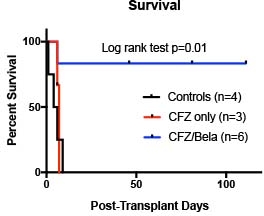Carfilzomib and Belatacept Reduces DSA and Prolongs Survival in a Highly Sensitized Rhesus Model of Kidney Transplantation
Duke Transplant Center, Duke University Medical Center, Durham, NC.
Meeting: 2018 American Transplant Congress
Abstract number: 1
Keywords: Alloantibodies, HLA antibodies, Kidney transplantation, Primates
Session Information
Session Time: 8:30am-9:30am
 Presentation Time: 8:30am-8:45am
Presentation Time: 8:30am-8:45am
Location: Room Hall B
Purpose:
Sensitized kidney transplant (KT) recipients have poor access to transplantation and inferior outcomes when transplanted. Conventional methods of desensitization remove donor specific antibody (DSA) temporarily, but may lack durability due to failure to control the germinal center (GC) reaction. We hypothesized that dual GC targeting with combined carfilzomib (CFZ) and belatacept (Bela) would produce durable desensitization in our highly sensitized rhesus model of KT.
Methods:
Maximally MHC-mismatched rhesus pairs were sensitized with two sequential skin transplants and then desensitized with CFZ (20 mg/m2 IV) and belatacept (20 mg/kg IV) weekly for one month. Peripheral blood, lymph node (LN), and bone marrow (BM) cells were analyzed pre- and post-desensitization. Anti-CD4 and CD8 depletion was given and swapping KT was performed. Animals were maintained on conventional triple immunosuppression post-transplant and closely monitored.
Results:
CFZ/Bela (n=6) reduced mean DSA by 44% (p = 0.0453). Peripheral CD4, CD8, and CD20 counts were unchanged by desensitization treatment. However, CFZ/Bela reduced peripheral PCs (mean 3.02% to 1.32% CD3[mdash]CD20[mdash]CD27+CD38+ cells, p=0.0231), LN Tfh cells (mean 5.31% to 1.90% CD3+CD4+PD1highICOS+ cells, p=0.0145), and LN Treg cells (mean 8.37% to 6.27% CD3+CD4+CD127[mdash]CD25+ cells, p=0.0119). Circulating CD4 and CD8 T cells were deviated towards a more Tnaïve-predominate phenotype. Five of six animals exhibited markedly prolonged graft survival. 
Conclusion:
CFZ/Bela permitted successful KT in highly sensitized rhesus monkeys. A possible mechanism for prolonged survival includes collapse of the GC by concurrently inhibiting PCs and upstream Tfh cells, as well as deviation of T cells to a more tolerogenic phenotype. This mechanistic desensitization regimen using commercially available drugs appears to hold promise for translation into human protocols given its minimal toxicity and more favorable protection of viral immunity compared to similar regimens.
CITATION INFORMATION: Ezekian B., Kwun J., Schroder P., Manook M., Yoon J., Mulvihill M., Freischlag K., Cochran J., Kroning K., Yi J., Knechtle S. Carfilzomib and Belatacept Reduces DSA and Prolongs Survival in a Highly Sensitized Rhesus Model of Kidney Transplantation Am J Transplant. 2017;17 (suppl 3).
To cite this abstract in AMA style:
Ezekian B, Kwun J, Schroder P, Manook M, Yoon J, Mulvihill M, Freischlag K, Cochran J, Kroning K, Yi J, Knechtle S. Carfilzomib and Belatacept Reduces DSA and Prolongs Survival in a Highly Sensitized Rhesus Model of Kidney Transplantation [abstract]. https://atcmeetingabstracts.com/abstract/carfilzomib-and-belatacept-reduces-dsa-and-prolongs-survival-in-a-highly-sensitized-rhesus-model-of-kidney-transplantation/. Accessed February 19, 2026.« Back to 2018 American Transplant Congress
